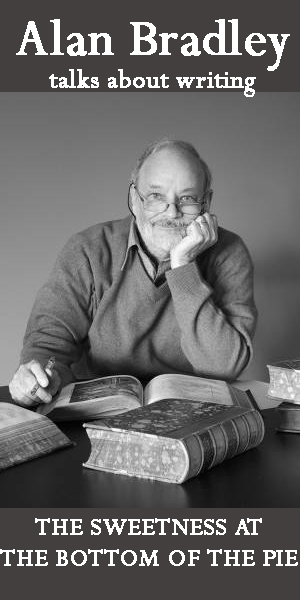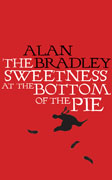Alan
Bradley was the winner of the 2007 CWA Debut Dagger Award. The Sweetness at the
Bottom of the Pie is the first in a trilogy of novels featuring Flavia de Luce.
Alan Bradley plants the story deep into the setting of 1950s England, with a
portrait of an eccentric home life that is all too wickedly familiar. The
story's twists are supported by the time and place as well as the unusual
interests of the characters which range from stamp-collecting to making poisons
all of which are highly researched and ingeniously incorporated. SHOTS asked
Alan to tell us a little about himself and of the series. Most authors, I think, would be able to tell you, almost to the second, when it was that their protagonist first flashed, full-blown, into their minds. Flavia de Luce came into being in rather a peculiar way. It was like this: I was struggling away at a new novel in which my detective, as part of a sub-plot, had just arrived at a rather decayed country house to interview the Colonel. As he climbed out of his car at the end of a long gravel driveway, the detective was surprised to see a pigtailed girl of about eleven, sitting on a folding camp-chair, writing in a notepad. He asked her what she was doing, and she replied, rather distantly, that she was writing down number plates. ‘I don’t expect you get many in such an out-of-the-way place.’ he teased her. ‘Well,’ she said, ‘I’ve got yours, haven’t I.’ I have to admit that Flavia’s sudden (and unplanned) appearance had taken me completely by surprise. I hadn’t the faintest idea who this girl was. She seemed to have come out of nowhere. I knew nothing about her. The book ground to a halt. After a lot of long walks and much thought, I finally realized that the only way I was going to find out was to go back to the beginning and let this girl tell me her story in her own words – in fact, to give her a book of her own. Once she got started, it seemed as if, like the Greek goddess, Athena, who sprang whole from the forehead of Zeus, Flavia had come fully equipped: from the smallest detail about the history of her eccentric family to her marvelous Victorian chemistry lab, and her passion for poisons, it was all there – all of it! Even more remarkable was the fact that I knew at once it was going to take Flavia more than one book to tell her story. Within a couple of days, I had roughed out in some detail, not only the events of the first six books, but also the broad arc of development that joined them. When the first fifteen pages of the first book, “The Sweetness at the Bottom of the Pie” won the CWA’s Debut Dagger Award in 2007, those 3000 words were all that existed of Flavia on paper. Now all I had to do was go home and write the remaining 93,000! By that time, the first book and two of its successors, had already been picked up for publication in the UK, Canada, and the US. “Well, alright,” you might ask, “but what’s a 69 year old man doing writing about an 11 year old girl in 1950’s England?” And it’s a fair question. The Roman author Seneca once said something like this: “Hang on to your youthful enthusiasms – you’ll be able to use them better when you’re older.’ So to put it briefly, I’m taking his advice. Seneca’s remark affected me so deeply when I first read it in my school days, that I remember writing it down in one of my notebooks, thinking, “Some day, I’m going to need this.” To me, Flavia embodies that kind of hotly burning flame of our young years: that time of our lives when we’re just starting out: when anything – absolutely anything! – is within our capabilities. It seemed to me that it would be interesting to have a murder as seen through the eyes of an eleven year old girl. It was something that hadn’t been done much before, and it was exciting to think of the possibilities. A girl of that age, in the 1950’s, would have been virtually invisible. Like Sherlock Holmes’s Baker Street Irregulars, she could go anywhere, see anything, overhear anything, without being noticed – she would be The Invisible Girl. I was also intrigued by the possibilities of dealing with an unreliable narrator; one whose motives were not always on the up-and-up. I was never an 11 year old girl, but I was the next best thing: an 11 year old boy, and I had the added advantage of having been close to that that age in the year the first book is set. In our household, in those pre-television days, we often spent winter evenings poring over dog-eared copies of Country Life and The Illustrated London News that had been discarded by our local library. I can still remember the adverts for the saloon motor-cars, the gin, the half-timbered country houses for sale, the duck ponds on village greens. To me, it seemed like a kind of European paradise. Although I never had the opportunity to go there, I created my own private England in my mind. It was a composite of Conan Doyle, cinder-track racing and public school serials in Chums Annuals, Ronald Searle’s ‘St. Trinian’s’, Lilliput magazine (surely one of the greatest little magazines in history), back issues of Punch, and the detective novels of Dorothy L. Sayers. Busman’s Honeymoon was one of the books my grandmother pressed into my eager hands when I was about eight, and pestering her for something to read. Another was The Awful Disclosures of Maria Monk. You can see that my grandmother was about sixty years ahead of her time. Needless to say, it was profoundly gratifying to be told by one of the Debut Dagger judges that they were convinced that the author of this anonymous first chapter had been born in England. My first trip to England didn’t come until I went to London for the Dagger Awards. Within just a couple of hours of landing at Gatwick, I was sitting at the bench of the organ upon which George Frideric Handel premiered the music for The Messiah, and I spent the week rambling through London churches while reading Peter Ackroyd’s Hawksmoor. The England that I was seeing with my eyes was quite unlike the England I had imagined, and yet it was the same. I realized that the differences were precisely those differences between real life, and the simulation of real life, that we create in our detective novels. Later, as I rattled through the English countryside on the train, I found myself recognizing place names that my grandparents had often mentioned, and it seemed somehow appropriate that exactly a hundred years had passed since they said their last farewells to beloved England. For me, it was like coming home. Sketchy as it is, that’s the best I can explain how Flavia de Luce and her family came into existence, and to live at Buckshaw, their decrepit country house near Bishop’s Lacey. Their world is a photograph of what’s inside my mind, and to judge from early reports, what’s inside the minds of a good many other people, too. So what it comes down to is this: can you, at 69, and on the strength of a handful of pages, sell a three book series for publication in twelve countries, nine languages besides English (including Hebrew, Korean and Catalan), an audiobook version, and a large print edition? In my experience, you certainly can.
THE SWEETNESS AT THE BOTTOM OF THE PIE
published by Orion Books, Jan 2009 hbk £12.99 Read SHOTS' review by Margaret Murphy
Visit the author’s website at www.flaviadeluce.com |


